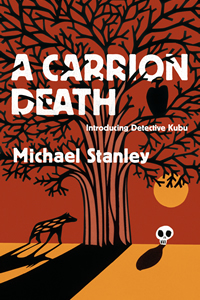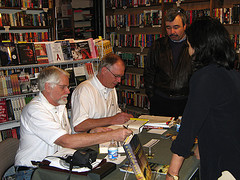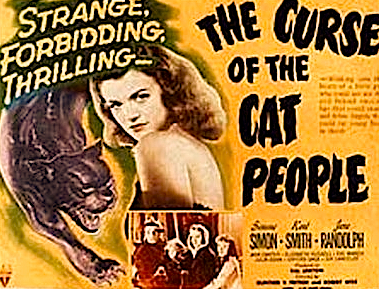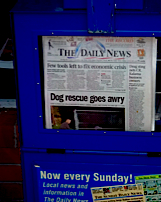
Did you find my recent series on character names enlightening? Mildly entertaining? Did I at least talk you out of naming your protagonist and his five brothers Harold, Harry (as a nickname for Henry, natch), Herbert, Norbert, Bertrand, and Humbert?
No? Well, did I manage to convince you not to refer to each of them by name fifteen times per page?
Even if you chose to blow off 99.2% of my advice in the series, please tell me that you checked the first five pages of your manuscript for these problems. Or that you will definitely do so before even thinking about slipping them into an envelope with a SASE and mailing them off to an agent, editor, or contest.
Don’t just make a vague, affirmative-sounding noise: I’m waiting for an actual promise here. Aspiring writers who are lax about checking for this type of repetition keep book doctors like me up at night.
Part of being a good developmental editor — as opposed to a good copyeditor, who concentrates on making sure that the writing is clear and the sentences grammatically correct, bringing the work to the minimum standard for professional writing — involves not only checking for possible red lights that might lead to rejection, but also figuring out what a manuscript’s strengths are, as well as why it will appeal to its target audience.
(And no, Virginia, those are not necessarily the same thing — but that’s a topic for another day.)
Most aspiring writers DO need to be reminded, I’ve noticed, what is good about their work, other than the fact that they themselves sat down and wrote it. Heck, many apparently need to be told what the selling points for their books are, if the typical responses to the perfectly straightforward questions, “Who is your target audience, and why will your book appeal to those folks?” are any indication.
There’s a pretty good reason for this, actually. Throughout the writing process, it’s awfully easy to start to think of the effort you’ve put into a book as its most important characteristic, isn’t it? But realistically, books literally never get acquired and published simply because someone went to the trouble to write them.
Okay, so books by celebrities and politicians occasionally do. I’m talking about works of literary merit here.
The vast majority of the time, though, manuscripts sell because of their strengths. In fact, should you ever happen to find yourself chatting about your work with an agent or editor, the length of time it took you to write a book is precisely the WRONG thing to mention in a pitch — or in a query letter, for that matter.
Why? Well, from a professional point of view, what matters is what’s on the page, not what Herculean efforts it took to get there. Or, to put it another way, everyone concerned is perfectly aware that every book requires Herculean efforts to bring from conception to completion, much less to publication.
So what agents and editors tend to conclude when writers rattle on about those efforts is not, “Gee, this book must be worthwhile,” but “Heavens – if a single draft took five years, how long will any revisions I want take?”
I know: it’s unfair; in actual practice, how long it takes to write a book is not a particularly good indicator of how long it would take to revise.
But as submitting writers are all too prone to forget, publishing is a business, not an art form — agents and editors acquire books they believe are marketable, not just ones they believe are well-written. And, as I believe I have mentioned several hundred times before, they do not — contrary to the hope of most submitting writers — read the entire submission before making up their minds on either point.
Anyone care to tell the class at what point in the average submission Millicent stops reading? For those of you who started reading this blog in February or later: it doesn’t necessarily correlate to the number of pages her agent boss asked you to send. Not at all.
How does this relate to the revision process, you ask, or to yesterday’s insights about the perils of name repetition on the manuscript page? Well, the swift judgments endemic to agencies, publishing houses, and yes, even contest judging mean that if you have limited revision time at your disposal, it’s smart strategy to concentrate on the first 50 pages of your manuscript — the usual first request from an agent — or, in a pinch, the first 5.
If, say, you were intending to comb your work for any of the many knee-jerk rejection reasons in the FIRST PAGES AGENTS DISLIKE category at right. Or even just to minimize the name repetition.
And yes, in response to what you just thought: that’s going to be a heck of a lot of work. One might even call it a Herculean task. Sorry about that.
While you’re rolling up your proverbial sleeves to launch into it, you might want to keep an eye out for a very, very common type of textual repetition, especially in book openings end endings: invocatory rhythms that don’t quite work.
Invocatory rhythms are one of the most popular tools aspiring writers use to beautify their narratives, a kind of sing-song rhythm that alerts the reader that Something Literary is Going on Here. As so many writers have been delighted to discover, one of the easiest ways to add this music to a text is through word and phrase repetition:
Geraldine ran through the corridor, ran like the wind, ran as though lions were behind her and the open arms of a knight in shining armor in front. Didn’t she deserve her freedom, after all this time? Didn’t she deserve a life free of the incessant demands of boss, husband, co-worker, photocopy machine, cat? Didn’t she, in fact, deserve to breathe the fresh air of autonomy?
That’s a relatively moderate use of invocatory rhythm. Here’s a galloping case of it:
Bewildered, Paul hung his head in shame. Not in shame, precisely: he hung his head partially in pride, a fierce pride that he had done the right thing, made the brave choice, under extremely trying circumstances. No, it was not in shame that he hung his head — that much was clear to him, even in the midst of the wilds of bewilderment. He was proud, pleased-proud, surprised-proud, PROUD in capital letters. He wouldn’t have canceled out his supposed shame even if he could have turned back time with a wave of his hand.
Yes, the rhythm here is indeed driving, but what a heck of a lot of word repetition! That’s what a professional reader is likely to take away from this paragraph, incidentally, not the emotional intensity. In fact, here’s how it’s likely to burn itself into Millicent the agency screener’s overworked retinas:
Bewildered, Paul hung his head in shame. Not in shame, precisely: he hung his head partially in pride, a fierce pride that he had done the right thing, made the brave choice, under extremely trying circumstances. No, it was not in shame that he hung his head — that much was clear to him, even in the midst of the wilds of bewilderment. He was proud, pleased-proud, surprised-proud, PROUD in capital letters. He wouldn’t have canceled out his supposed shame even if he could have turned back time with a wave of his hand.
To put it less graphically, it’s the repetition that Millicent is likely to notice, rather than the poetic rhythm. Notice, too, that it’s not only the verbatim word and phrase repetition that will make her grind her teeth: words that scan similarly, like wild and Bewildered are likely to stick in her craw as well. As will different forms of the same verb.
Just in case any of you were thinking of using have, having, and had within the course of a single paragraph.
I’ve been sensing some head-shaking out there throughout my discussion of these examples. “I see that there are repeated words here, Anne,” these disapprovers say, “but surely that is a stylistic choice on the author’s part, a matter of bending the ordinary rules of writing in order to produce a particular type of voice — in this case, one that sounds like chanting. Unless you have just inadvertently proven your oft-made point about not every reader’s liking every voice, and you are demonstrating yourself to be the kind of knuckle-dragging troglodyte who eschews the joys of literary fiction in favor of novels that — ugh — have a plot?”
Actually, I’ve been known to read and enjoy both, oh ye quick to judge — and what’s more, I’ve read plenty of literary fiction with strong plots AND genre fiction that features beautiful language. So there.
But you are right that the example above is far more likely to have dropped from the fingertips of a writer with specifically literary aspirations than one who was aiming for a more mainstream market. Since invocatory rhythms are quite common in poetry, this style turns up very frequently in the work of writers who write it. Unfortunately for Millicent’s aching eyes, it’s also a frequent guest device in novel and memoir submissions, particularly in those that are either literary fiction or are other types of manuscript written with an overtly literary voice.
It just SOUNDS pretty, somehow.
“If the writing’s pretty,” the head-shakers argue, “how could THAT be problematic in a submission?”
In many ways, believe it or not. Rather than telling you why, let’s look at the single most famous piece of invocatory prose in English literature, the opening to Charles Dickens’ A TALE OF TWO CITIES. (Yes, yes, I know: I’m fond of this particular example, but honestly, it’s one of the best examples of how not to write a first page ever written. Bear with me here.) Just for kicks, pretend that you have never seen it before, and try to read like an agency screener:
It was the best of times, it was the worst of times, it was the age of wisdom, it was the age of foolishness, it was the epoch of belief, it was the epoch of incredulity, it was the season of Light, it was the season of Darkness, it was the spring of hope, it was the winter of despair, we had everything before us, we had nothing before us, we were all going direct to Heaven, we were all going direct the other way – in short, the period was so far like the present period, that some of its noisiest authorities insisted on its being received, for good or for evil, in the superlative degree of comparison only.
There were a king with a large jaw and a queen with a plain face, on the throne of England; there were a king with a large jaw and a queen with a fair face, on the throne of France. In both countries it was clearer than crystal to the lords of the State preserves of loaves and fishes, that things in general were settled for ever.
Or if you want to don Millicent’s eyeglasses even more thoroughly, take a gander at it in standard manuscript format:
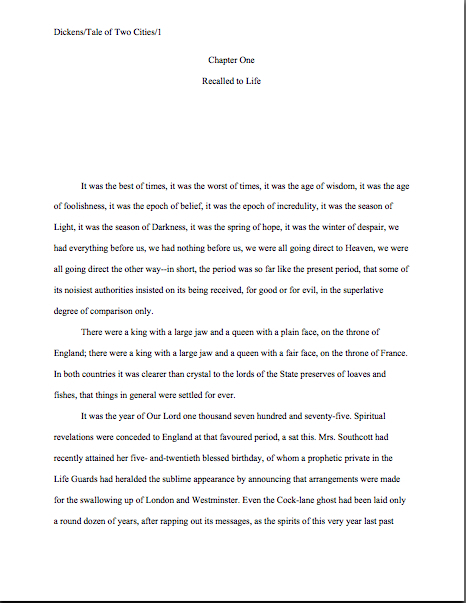
Now, this voice is certainly distinctive, isn’t it? Hard to conceive of a more memorable opening, rhythmically speaking. (Clearly, I haven’t been able to get it out of my head, since I used it as an example of something else entirely not too long ago.) But it’s also true that if these were the first two paragraphs of a submission, pretty much any professional reader today would have rejected it by line three.
Close your eyes, channel Millicent, and tell me why.
If you said that it was because the first paragraph is one interminable run-on sentence — 119 words, connected incorrectly by commas, rather than semicolons, sacre bleu! — give yourself lollipop, a pat on the head, and an A for the day.
Ditto if you zeroed in upon the apparently random capitalization of nouns, the criminal punctuation choices, the ubiquitous logical contradictions (yes, I know Dickens meant it to be ironic; stop parroting your high school English teacher and think like a screener for a moment), and the fact that two paragraphs into the piece, the reader still has absolutely no idea who the protagonist is or what’s going on.
And can’t you just picture an editor furiously scribbling in the margins: “Which was it — the best of times or the worst of times? Commit to one or the other! The reader only knows what you tell him!”
However, there is a subtler reason — which will be abundantly apparent if you stand up right now, take two steps backward from your computer monitor, and take another look at Dickens’ opening.
See the visual pattern? Millicent would have spotted it as soon as she pulled the first page out of the envelope.
If you’ve been revising for a while (or if you paid close attention to the title of this post), you might have caught that the problem was repetition without backing away: the first ten verbs are identical, after all. But it’s not just the repeated words and phrases that would raise professional readers’ weary eyebrows here: it’s the structural repetition, the phenomenon of consecutive sentences being set up in the same way.
Dickens, bless his now-still heart, has provided us with a lulu of an example of why structural repetition is problematic in print. No matter how great your high school English teacher told you this particular opening was, it’s an undeniable fact that it’s dull for the reader to read the same It was X, it was Y sentence structure over and over again.
Or, indeed, any given sentence structure, if it is repeated often enough within too few lines of text. Even had Dickens wielded all of those semicolons correctly (he didn’t, by current grammatical standards), Millicent would have known at a glance that an opening this repetitious was unlikely to be an easy sell, either to readers or to her boss, the agent.
And for precisely the same reason: it’s both conceptually boring and hard on the eyes to read that many similarly-structured sentences in a row.
Unfortunately, a lot of writers really LIKE structural repetition: it reads a bit like a prayer — or if your tastes are more secular, like a poem. As we saw in all of today’s examples, it can provide a driving, almost galloping rhythm to a page. Many aspiring writers see that rhythm in the work of authors they admire and say, “Wow, that’s cool. By jingo, I’m going to make my paragraphs read like that!”
That’s a perfectly legitimate voice choice — provided that it is used sparingly. Like any magic trick, however, repetitive structure loses its ability to charm when the reader sees it too often; after a while, it can start to come across less as an interesting stylistic choice than as a sort of narrative tic.
How often is too often? Well, let me ask you: how many iterations of It was… did Dickens put you through before you first murmured, Oh, come on, Chuck; get on with it?
For Millicent, that number is likely to be as low as two, even if the repetition isn’t in consecutive sentences. Why so few? Well, editors are trained to zero in on redundancy and excise it, so it shouldn’t come as too much of a surprise to anybody that the contest judges, agents, and Millicents who cull the herd of submissions should develop a sensitivity to something likely to offend an editor’s sensibilities. If a particular stylistic choice is unlikely to sell to a publishing house, those whose job it is to find the bestsellers of tomorrow have to pay attention that editorial preference.
So yes, in answer to what practically all of you were thinking at the beginning of the last paragraph, Millicent — or any other professional reader who has been at it a while — honestly may notice structural repetition the first time it occurs, not the seventh. But that’s a matter of speculation, as she is very, very unlikely to still be reading long enough to stumble upon #7.
Heck, it’s not all that uncommon for a professional reader to sit bolt upright in the middle of page 172, exclaiming indignantly, “Hey, this writer is reusing sentences!” if the first iteration occurred on page 3. Millicents tend to have good memories for text.
So do agents, editors, contest judges, writing coaches, and pretty much everyone else who reads work-in-progress for a living. Which is why, in case you’ve spent years wondering, recipients of professional feedback are so often stunned by assertions that their manuscripts use particular words or phrases constantly. To someone with a memory trained for editing, four times in a 300-page submission may feel pretty constant.
Don’t repeat yourself more than is absolutely necessary.
“Okay, okay,” I hear some of you rules lawyers out there murmuring, “I understand that Millicent is hyper-sensitive to reused sentences and repeated sentence structures. But as you pointed out yourself, Anne, many writers like to open and close their books with poetic rhythms; that doesn’t necessarily mean that the entire book will be written that way. A TALE OF TWO CITIES doesn’t continue repetitively, after all. So why doesn’t Millicent just assume that the device will end in a page or two and read on?”
Well, the easy answer is something that we spent most of last January discussing: Millicent seldom makes it all the way to the end of page one. She’s not in the habit of reading on until she gets to a patch of text she likes. (Too bad our pal Chuckles blew his chance by repeating himself so much, eh?)
I could sidestep the crux of the question by leaving it at that, but the real issue is why a professional reader would assume that the way a manuscript opens is necessarily indicative of what is to come. It’s an excellent question, because this assumption does underlie any rejection on page one. The fact is, though, that this presumption is not always inaccurate, at least with regard to redundancy. More often than not, when a manuscript opens with repetitive structure, it will continue with repetitive structure.
Obviously, this renders invocatory repetition dangerous for a writer to use in the first pages of a submission. Or book proposal. Agents and editors are just so used to this tendency that they’re all too likely — fairly or not — to conclude that to read on would be to be treated to the same type of sentence over and over, ad infinitum.
And that, my friends, would be less poetic than soporific.
Next time, I shall talk about ways to tell which is which in your writing, to figure out when and how invocatory rhythms will help your work. Keep up the good work!
